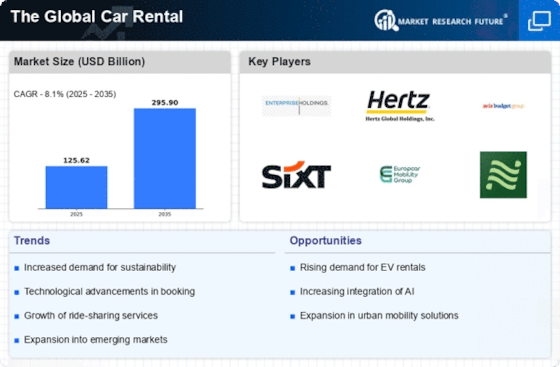Top Industry Leaders in the Car Rental Market
*Disclaimer: List of key companies in no particular order
The car rental industry is a constantly evolving and dynamic landscape, shaped by a mix of well-established players and innovative newcomers striving for customer loyalty and market dominance. The growth of this sector can be attributed to factors such as increasing disposable incomes, a surge in travel and tourism, and the rapid pace of urbanization, particularly in developing nations.
Key Market Players: Prominent players in the car rental market include Avis Budget Group, Europecar, Enterprise Holdings Inc., The Hertz Corporation, Toyota Rent-a-Car, Sixt SE, Alamo Rent-a-Car LLC, Carzonrent India Pvt Ltd, Localiza, ANI Technologies Pvt. Ltd, and others. The market is characterized by a few major players, each with distinct strengths and weaknesses.
Dominant Players' Profiles:
Strategic Approaches: To stay competitive, key players employ various strategies, including expanding fleet sizes, diversifying offerings, investing in technology and digitalization, forming strategic partnerships, adopting dynamic pricing strategies, and engaging in mergers and acquisitions.
Factors Influencing Market Share: Several factors impact market share within the car rental industry, such as brand reputation, price competitiveness, fleet size and variety, location and accessibility, technology and digital presence, and customer service and loyalty programs.
Entry of New and Innovative Companies: Emerging companies are introducing innovative offerings and disruptive business models, such as peer-to-peer car rental platforms, car subscription services, and mobility solutions companies, providing customers with more personalized and flexible alternatives.
Competitive Landscape: The competitive landscape is both fragmented, with a mix of international and regional players, and consolidating, as larger companies acquire smaller ones to gain market share and economies of scale. New technologies and business models pose both challenges and opportunities for established players.
Future Outlook: The global car rental market is expected to continue growing, driven by factors such as increasing travel and tourism, rising urbanization, and a growing demand for convenient and flexible transportation solutions. Intensifying competition will likely see players focusing on innovation, digitalization, and enhancing customer experience to differentiate themselves and capture market share.
Company Updates:










